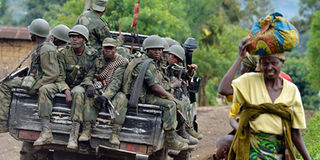16 killed in three days of DR Congo clashes

Armed Forces of the Democratic Republic of Congo soldiers move towards the Mbuzi hilltop near Rutshuru on November 4, 2013 to hunt fighters allied to chief Kamwina Nsapu. More than a dozen people have been killed in fighting this week that pitted the Democratic Republic of Congo's army against a rebel militia. FILE PHOTO | JUNIOR D. KANNAH | AFP
What you need to know:
- The United Nations MONUSCO peacekeeping mission on Wednesday said the militia posed "a real threat" to security in eastern DR Congo.
- Uganda in January said that 40 M23 rebels living at a military base since 2014 had disappeared, and that about 100 more had been caught trying to cross into DR Congo.
GOMA
Sixteen people have been killed in three days of fighting this week that pitted the Democratic Republic of Congo's army against a rebel militia, a military spokesman told AFP Thursday.
Guillaume Djike, a spokesman for the army in troubled North Kivu province in the east of the nation, said 16 people had been killed from Monday to Wednesday, while five rebels from the M23 militia had been captured and 58 others had surrendered.
Djike did not specify whether the dead were rebels, troops or civilians.
M23 is a mostly ethnic Tutsi rebel group that mutinied against DR Congo in 2012, saying a peace accord signed in 2009 had not been respected by the government.
The militia was defeated the following year, and hundreds of fighters fled the country.
But in January, the government and residents of North Kivu said they had seen M23 fighters return from neighbouring Uganda.
The United Nations MONUSCO peacekeeping mission on Wednesday said the militia posed "a real threat" to security in eastern DR Congo.
It said it had evidence that members of the group had returned to the country.
Liberata Buratwa, a local official, called on people who had fled the latest wave of clashes to neighbouring Uganda to return home.
"Today the situation is calm. We ask the people who fled the fighting to Uganda to return to the country because the situation has returned to normal," Buratwa said.
In a statement from the Ugandan capital Kampala on Wednesday, M23 blamed the Congolese government for the spike in violence.
"Ex-fighters who returned to their country were unarmed and had no intention to wage war," M23 said.
"The government's decision to push returning ex-fighters into war, forcing them to defend themselves, sends a negative signal to their colleagues" in Uganda and Rwanda, the statement said.
Uganda in January said that 40 M23 rebels living at a military base since 2014 had disappeared, and that about 100 more had been caught trying to cross into DR Congo.
The Congolese government, for its part, said this month that some 200 former M23 fighters had occupied a village in North Kivu province.





